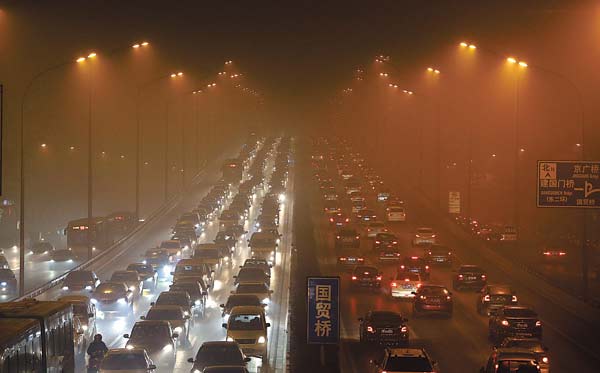Beijing moves to curb prolonged haze pollution
Updated: 2013-01-14 02:19
(China Daily)
|
||||||||
BEIJING - Choked in dense smog for three consecutive days, Beijing started emergency response measures on Sunday to curb the air pollution at hazardous levels.
Monitoring data showed the Air Quality Index in most parts of the capital reached 500, the maximum pollution level, on Sunday, the third hazy, grey day.
 |
| The capital's Third Ring Road is shrouded in haze on Saturday as the city's air pollution reached hazardous levels. [Agencies] |
Emergency response measures were adopted on Sunday in some areas to deal with the heavy pollution, a senior official with the Beijing Municipal Environmental Protection Bureau said.
Outdoor sports activities for primary and middle schools were ordered to be halted from Sunday to Tuesday in extreme pollution areas, including Tongzhou, Miyun, Daxing, Mentougou and Fangshan districts, the municipal authorities said.
Construction was suspended at 28 construction sites and 54 businesses reduced their emissions by 30 percent, with Beijing Hyundai Motor Company halting production on Sunday, the Beijing Municipal Environmental Protection Bureau said.
Fourteen inspection teams were dispatched to 14 districts and counties to oversee the pollution-reduction measures on Sunday, the bureau added.
Beijing has a permanent population of around 20 million and some 5.2 million vehicles.
Pollutants, parts of which came from vehicle waste and coal burning in the chilly winter, gradually accumulated in recent windless days. The hazy weather would continue until Wednesday in Beijing, local meteorologists said.
"Such a prolonged pollution is rare in Beijing," said a university undergraduate who only gave his surname Wang. He wore a mask to "avoid pollution and flu infection."
The 22-year-old student, who has been living in Beijing since childhood, told Xinhua he expected the government to take more timely and effective actions, such as the dissemination of air pollution information and the suspension of classes for children who are vulnerable to diseases.
Doctors with the Beijing Chaoyang Hospital and the Beijing Children's Hospital said the number of patients with respiratory disease had jumped sharply in the past few days.
Starting from January 1, real-time air quality monitoring data on PM2.5 intensity in China's 74 major cities, including Beijing, is available for citizens, a move at the request of the public.
The PM2.5 index is considered stricter than the PM10 standard previously adopted in China. It measures airborne particles smaller than 2.5 micrometers, which are more hazardous to people's heath.

 Li Na on Time cover, makes influential 100 list
Li Na on Time cover, makes influential 100 list
 FBI releases photos of 2 Boston bombings suspects
FBI releases photos of 2 Boston bombings suspects
 World's wackiest hairstyles
World's wackiest hairstyles
 Sandstorms strike Northwest China
Sandstorms strike Northwest China
 Never-seen photos of Madonna on display
Never-seen photos of Madonna on display
 H7N9 outbreak linked to waterfowl migration
H7N9 outbreak linked to waterfowl migration
 Dozens feared dead in Texas plant blast
Dozens feared dead in Texas plant blast
 Venezuelan court rules out manual votes counting
Venezuelan court rules out manual votes counting
Most Viewed
Editor's Picks

|

|

|

|

|

|
Today's Top News
Boston bombing suspect reported cornered on boat
7.0-magnitude quake hits Sichuan
Cross-talk artist helps to spread the word
'Green' awareness levels drop in Beijing
Palace Museum spruces up
First couple on Time's list of most influential
H7N9 flu transmission studied
Trading channels 'need to broaden'
US Weekly

|

|







